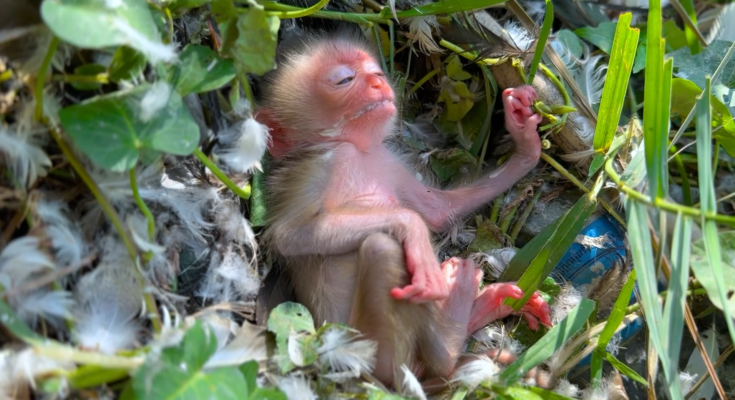Baby monkeys, much like any infant, rely on their mother’s care for nourishment, warmth, and protection. Unfortunately, when a baby monkey is orphaned, injured, or in distress, it may require human intervention to survive and thrive. If you encounter a poor baby monkey in need, it’s crucial to provide the right care, especially in terms of feeding and overall support, to give it the best chance of recovery and survival. This guide will walk you through the steps you can take to help a baby monkey in need of milk and care.
Step 1: Assess the Situation
Before taking any action, it’s important to assess the baby monkey’s condition. Look for signs of injury, malnutrition, or dehydration. If the monkey is injured, immediately seek the help of a licensed wildlife rehabilitator or veterinarian who can provide medical assistance. If the baby appears healthy but is simply orphaned, your role as a temporary caretaker becomes crucial in ensuring its survival.
Step 2: Find the Right Milk Substitute
Newborn and young monkeys rely on their mother’s milk for essential nutrients. Since it is not safe to feed a baby monkey cow’s milk (it can cause serious digestive issues), you must use a milk substitute specifically designed for primates. Several products on the market, such as specialized baby monkey milk formula or kitten milk replacement (KMR), can provide the necessary nutrition for the baby’s development.
Be sure to avoid homemade remedies like diluted milk or sugar water, as they can harm the infant’s digestive system. If unsure about which product to use, consult a wildlife rehabilitation expert for guidance.
Step 3: Prepare the Milk and Feeding Equipment
Once you have obtained the right formula, prepare it according to the instructions provided by the manufacturer. Most formulas will require mixing with water to create the right consistency. Always use clean equipment, including sterilized bottles and nipples, to ensure the baby monkey’s safety and prevent infections.
Make sure the milk is at a warm temperature, similar to body temperature (around 98-100°F or 37-38°C). Test the milk on your wrist to ensure it’s not too hot or cold before offering it to the baby.
Step 4: Proper Feeding Technique
Feeding a baby monkey can be tricky, as their natural instincts may lead them to nurse from their mother’s body. Here’s how you can help them:
- Gently hold the bottle near the monkey’s mouth, allowing it to latch onto the nipple. Be patient and give the baby time to adjust to this new feeding method.
- Keep the baby monkey in a comfortable, upright position, similar to how it would nurse from its mother.
- Do not force-feed. Allow the baby to suckle at its own pace, and be mindful not to overfeed or make it drink too quickly, as this could lead to choking or aspiration.
Step 5: Provide Ongoing Care and Monitoring
After feeding, keep the baby monkey warm and safe. Young primates cannot regulate their body temperature efficiently, so it’s important to provide a warm environment for them. You can use a heating pad, warm water bottle, or even soft towels to create a cozy space for the baby.
Monitor the baby’s health closely. Look out for signs of lethargy, poor appetite, or difficulty breathing, as these could indicate serious health concerns. If the baby monkey is not gaining weight or seems weak, contact a professional wildlife rehabilitator as soon as possible for additional support.
Step 6: Reintroducing the Baby Monkey to the Wild
If you’ve successfully cared for the baby monkey and it’s strong enough to survive on its own, the goal should always be to return the animal to the wild where it belongs. A wildlife rehabilitator will guide you through the process of reintroducing the monkey to its natural habitat, ensuring that it learns survival skills and finds its place in a suitable social group.
Conclusion
Caring for a poor baby monkey requires patience, commitment, and the right resources. By providing proper nourishment with a safe milk substitute, offering warmth and comfort, and seeking professional help when needed, you can help give an orphaned or sick baby monkey a chance at a healthy life. However, always remember that the best outcome for any wild animal is to be returned to its natural environment as soon as it is capable of surviving independently.



